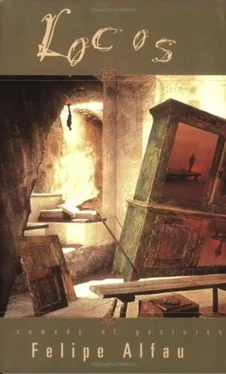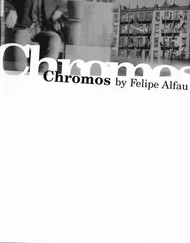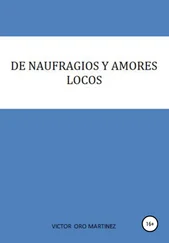It is not only the characters of Locos that have that queer shimmer or iridescence. Place and time are subject to it as well. A fact I think I missed back in 1936 is the discrepancy between the location of the Café de los Locos — Toledo — where the “characters” are gathered for inspection, and their actual residence — Madrid. What are these Madrileños doing in Toledo? I suppose it must be because of the reputation of Toledo as a mad, fantastic city, a myth, a city, as Alfau says, that “died in the Renaissance”; he speaks of “Toledo on its hill. like a petrified forest of centuries.” The city that died in the Renaissance and lives on, petrified, can of course figure as an image of Spain. One more quotation may be relevant to the underlying theme of impersonation as a national trait: “the action of this book develops mainly in Spain, a land in which not the thought nor the word, but the action with a meaning — the gesture — has grown into a national specialty. ”
Spain and its former possessions — Cuba and the Philippines— constitute the scene; their obverse is China, for a Spaniard the other end of the world, and here the provenance of Señor Olózaga, baptized “Juan Chinelato” by the bearded, tobacco-smoking monks who raised him.
One thing that certainly escaped me as a young reviewer is the hidden presence of this “Juan Chinelato” in the first chapter, the one called “Identity” and laid in the Café of the Crazies. He is there in the form of a little Chinese figure made of porcelain being hawked by Don Gil Bejarano in his character of junk dealer. “Don Gil approached us,” writes Alfau. “ ‘Here is a real bargain,’ he said, tossing the porcelain figure on the palm of his hand. *It is a real old work of art made in China. What do you say?’ I looked at the figure which was delicately made. It represented a herculean warrior with drooping mustache and a ferocious expression. He had a butterfly on his shoulder. The color of the face was not yellow but a darker color, more like bronze. ’ Perhaps it is not Chinese but Indian.’ Don Gil. looked slightly annoyed. ‘No, it is Chinese,’ he said.” And he continues to praise it: “ ‘Yes, this is a real Chinese mandarin or warrior, I don’t know which, and it is a real bargain.’ “ A minute later, thanks to an inadvertent movement, the figure is smashed to pieces on the marble-topped café table.
This is a beautifully constructed book and full of surprises. Another example: one does not notice in this opening chapter the unusually small hand of Don Gil, seen only as a mark on a whitewashed wall. The lightly dropped hint is picked up unobtrusively like a palmed coin several chapters later when Don Gil is being arrested at the reluctant order of his brother-in-law because his fingerprints have been found all over the scene of a crime: “Don Gil had very small hands. and the handcuffs did not fit securely enough. ‘Officer, those handcuffs are too big for me. You had better get a rope or something.’ “ In his conversations with the Prefect, he has kept working “the man from China,” that is, the man who has the perfect alibi but is tracked down by science through the prints his hands have left. His last article, published in a Madrid newspaper on the day of his apprehension, is entitled “Fingerprints, a sure antidote against all alibis,” and his last words, which he keeps reiterating as he is carried off in the police wagon, are “I am the man from China. Fingerprints never fail.”
Perhaps police work and criminality, just as much as mad, fantastic Spain, are the subject of Locos . And considerable detection is required on the reader’s part, to be repaid, as in the hunt for “Wanted” lawbreakers, with a handsome reward. For instance, among the clues planted to the mute presence of Señor Olózaga in the Café of the Crazies there is simply the word “butterfly”; I failed to catch the signal until the third reading. And I still have a lot of sleuthing to do on Carmen-Carmela-Lunarito and the beauty spot on Lunarito’s body that she charges a fee to show. A knowledge of Spanish might help. In the Spanish light, each figure is dogged by a shadow, like a spy or tailing detective, though sometimes the long shadow is ahead: “She stood at the end of her own shadow against the far diffused light of the corner lamp post and there was something ominous in that.” It may be that this is the link between the theme of Spain and the theme of the criminal with his attendant policeman. In some moods Locos could be classed as “luminist” fiction. But I must leave some work (which translates into pleasure) for the reader.
If Locos is, or was, my fatal type, what I fell in love with, all unknowing, was the modernist novel as detective story. There is detective work, surely, supplied by Nabokov for the reader of Pale Fire . I mentioned Calvino, too, but there is another, quite recent example, which I nearly overlooked. The Name of the Rose , of course. It is not only a detective story in itself but it also contains an allusion to Sherlock Holmes and The Hound of the Baskervilles . But in Locos Sherlock Holmes is already present: while in England Pepe Bejarano pretends to have studied under him, which explains his uncanny ability to recover his uncle, the Prefect’s, wallet. The grateful police officer, who does not know whether Conan Doyle’s creation is a real person or not, wants to express his thanks. “ ‘Yes, Pepe, yes. I should like to write an official letter to that gentleman, to that great man — Cherlomsky, is that the name?’ “
Yes, there is a family resemblance to Nabokov, to Calvino, to Eco. And perhaps, though I cannot vouch for it, to Borges, too.
Mary McCarthy
[1] I must confess that when I heard the narrative of his dream by El Cogote, which I transcribe freely, I realized that Dr. de los Rios was right in saying that this man was an extraordinary person.
[2] Garcia had other plans for this story, but by substituting one coin for the other and creating an unexpected situation for him, I have him at my mercy. He has now no time to formulate a new plan of battle and I can make him do as I please and have the story follow along the lines I choose.
[3] That is what Garcia felt, but although he does not know it, I am the one who is forcing his actions. Since I had the inspiration of substituting the coins I have had him in my power and now can confidently leave him in the expert hands of the reliable veteran Don Laureano Baez.
[4] The reader may disregard this interruption of two characters whom I had not intended for this story, but who are endeavoring to complicate matters on the stage by making noise in the wings.
[5] For the second time these two characters are forcing themselves into this narrative against my orders. I had purposely placed them away in another room from that in which this scene is taking place, but since they cannot be seen, they are making themselves heard, and I am afraid we can no longer disregard them, as the other characters have already heard them and taken notice.
[6] The Dance of the Flea, a depraved performance usually given in second-rate theaters and cafés cantantes , in which a lady appears in a transparent nightgown with a candle in her hand and proceeds to look for an insidious flea which hides most cleverly, until it is found where every intelligent flea would hide.
[7] As a matter of fact, I lighted the match to illuminate the scene momentarily and get my bearings. When I began this story I did not foresee the inconvenience of such complete darkness and that it would be extremely difficult to make my characters move property without being able to see even the paper in front of me. However, my match went out too soon for me to ascertain much, but not for Pepe Bejarano to take action, and now everything is dark again and the characters will have to be left to their own resources, meanwhile waiting until tomorrow brings the consequences to light.
Читать дальше












